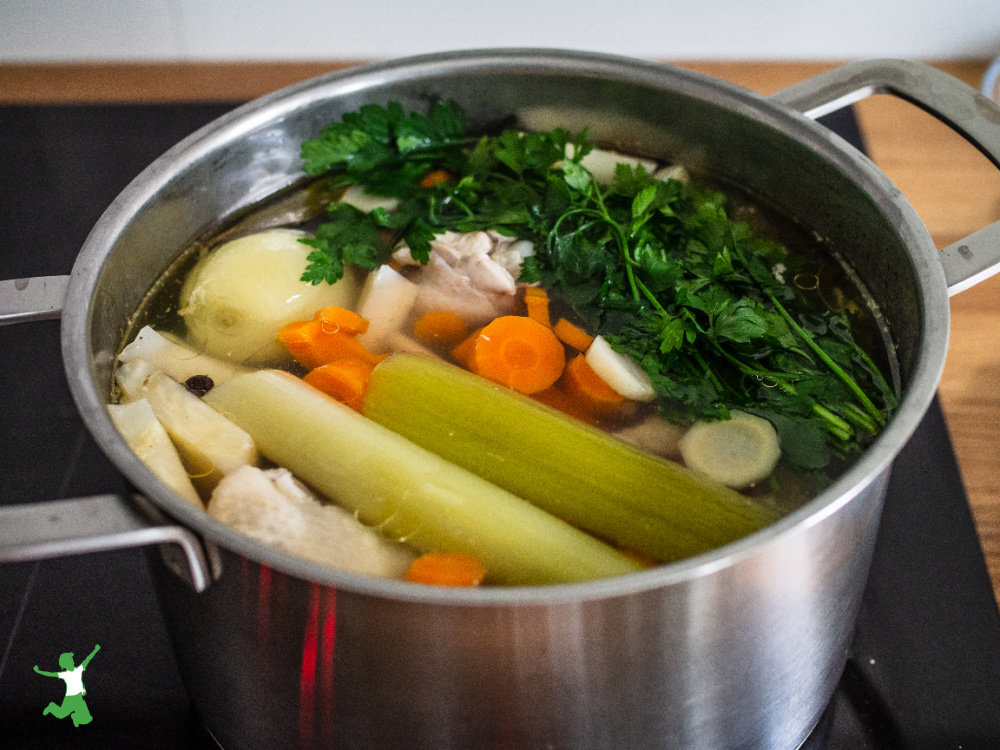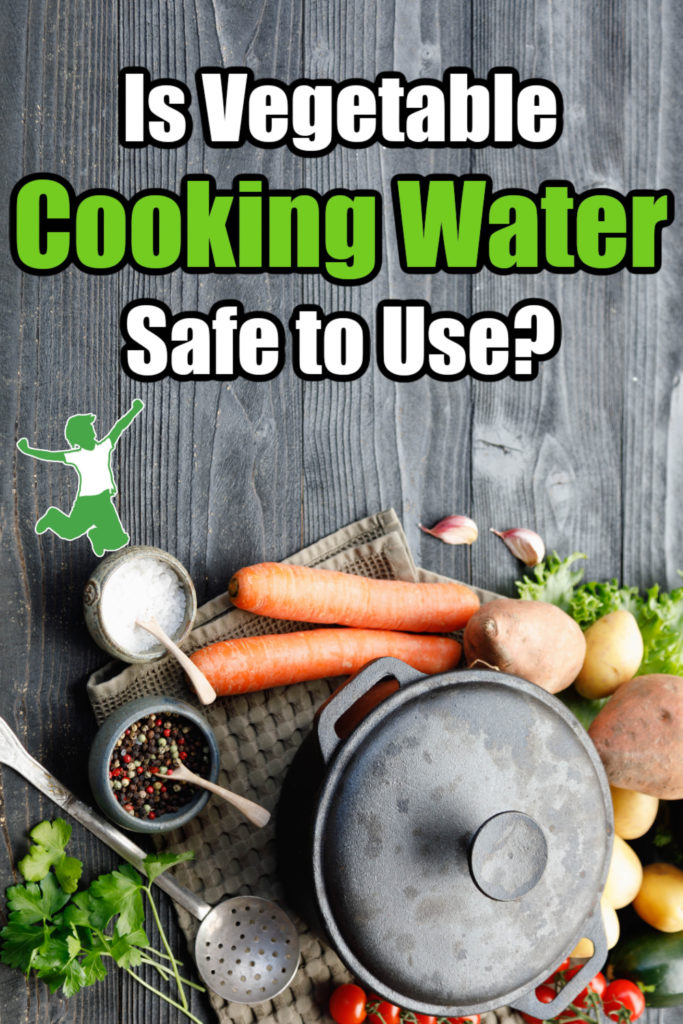Guidelines for when vegetable cooking water is safe to use and when it is best to toss due to nitrites, residues or anti-nutrients that can do more harm than good.

Adelle Davis popularized the practice of saving vegetable cooking water during the Leave it To Beaver era of the American 1950s.
She reasoned that any vitamins and minerals lost from cooking the vegetables would end up in the water.
This supposedly nutrient-rich cooking water could then be added to homemade soups or sauces with the nutrition benefiting those that consumed them.
This notion took hold and has not let go to this day.
Unfortunately, reserving vegetable cooking water can do more harm than good.
Consider the reasons below before you use it in your dishes. How to know your veggie cooking water is safe is discussed as well.
Chemical Residues
If the vegetables that are cooked are not organic, pesticides and nitrites from commercially produced fertilizers can end up in the cooking water.
Even low to no spray veggies such as asparagus would not be safe.
These crops are still typically fertilized with commercial preparations that are high in nitrites.
Anti-Nutrients
Cooking cruciferous vegetables such as broccoli, cauliflower, cabbage, Brussels sprouts, and kale would add goitrogenic (thyroid blocking) substances to the cooking water which should be discarded.
Water used to boil potatoes would contain chemicals called hemagglutinins that disrupt red blood cell formation.
Dark green, leafy vegetables such as beet greens, raw spinach, and chard contain oxalic acid that blocks calcium and iron absorption.
This irritating substance also can cause distress to the sensitive mucous membranes in the mouth and intestinal tract and contributes to the formation of kidney stones.
Consuming raw crucifers or dark, leafy greens is not an alternative either as the substances that cause problems when in the cooking water also cause problems if consumed directly with the vegetable in an uncooked state such as a raw green smoothie.
Legumes & Beans
For the last few years, the vegan community has popularized the trend of reusing legume cooking water, particularly from chickpeas.
This isn’t a safe practice even if the legumes or beans are soaked before cooking.
This soapy, slimy water is called aquafaba and is used as an egg replacement, particularly in dessert recipes. It whips up foamy just like egg whites.
Published research reveals that chickpea cooking water contains saponins, a potent anti-nutrient that contributes to leaky gut, which is at epidemic levels today.
It is also not advisable for pregnant women to consume this substance as it is a miscarriage risk.
Safe Vegetable Cooking Water
Do you really want to use vegetable cooking water as a frugal tool in your kitchen routine?
Consider this list of some of the most popular vegetables below. They are safe to use for that purpose.
- carrots
- turnips
- potatoes (peelings)
- parsnips
- beets
- celery
- organic pumpkins and squash (including zucchini)
- organic onions, leeks, and garlic
- nightshades (tomatoes, eggplant, and peppers among a few others)
For example, this potassium broth recipe uses vegetables simmered in water from the list above.
Simple Guidelines To Follow
Do you find it confusing to remember the distinctions between which organic veggies are safe to use and which are not?
Or, do you buy some veggies organic and others conventional?
If so, it is best to just adopt the practice of not using the cooking water at all.
This is particularly true if you tend to mix veggies together when cooking them.
Never Use Veggie Water for Baby Food
It is of particular importance NOT to use vegetable cooking water for use in pureeing homemade baby food.
Use pure filtered water instead, or if baby is old enough, some homemade bone broth or meat stock.
Final Caution to Consider
One final word of caution.
All vegetables tend to form nitrates after cooking and during storage. These nitrates can transform into strong carcinogens in the intestines.
Hence, it is best to avoid refrigerating and reheating vegetables, particularly leafy, green vegetables which concentrate nitrates when grown commercially.
References
Nourishing Traditions Cookbook









That’s interesting. Without any scientific knowledge at all, my mother learned from her own mother to boil dark leafy greens and cruciferous and then discard the water. By doing so, the vegetables were ‘lighter’ -as better digested- for the stomach (that was their explanation).This comes from my Mediterranean heritage.
I first saw people eating raw cruciferous in Northern Europe and after that, when I recently came to live in North America… I was almost convinced that it was healthier but I just couldn’t imagine eating them raw..!
Thanks, I usually stick to carrots, celery, onion, garlic, herbs, leeks and depending on the soup; lentils, peas, beans, poblanos, tomatoes, mushrooms, sweet potatoes, squash, artichokes, asparagus and greens. I very infrequently do veggie soup with cabbage.
I steam, roast, or sautee pretty much all my vegetables.
I generally reserve cooking water (and we eat almost exclusively organic) to water the indoor plants after it has cooled.
Here is a different take on nitrates in vegetables, with some recent studies cited: http://wholehealthsource.blogspot.com/2010/06/nitrate-protective-factor-in-leafy.html
Debbie Kurtz Schnell I don’t personally choose to cook cruciferous veggies in the soup I will be consuming. I cook them separately, discard the water and then add them already cooked. Other veggies like carrots etc would be fiine.
Esther Ramer Kingfisher I don’t know for sure and havent’ seen any testing on this either .. I would just cook them fresh each time if you are concerned.
Several of us have asked directly on your blog about frozen greens such as kale. Does freezing after a light blanching protect from nitrate formation? I always discard the blanching water.
My grandmother lived to 94. When asked to what she attributed it, she told me that she always saved the vegetable water from everything she cooked and used it in soup, or drank it. 🙂 I have my Mom’s 1950 copy of Adele Davis’ book, “Let’s Eat Right” — ny Mom…..ahead of her time!! And 84!
reposting: What about soup that is made from vegetables cooked in the liquid that eventually IS the soup? I am really confused and concerned about this as I have multiple auto-immune diseases and never seem to get well… no matter how ‘healthy’ I eat. Could my soup be making me sick???